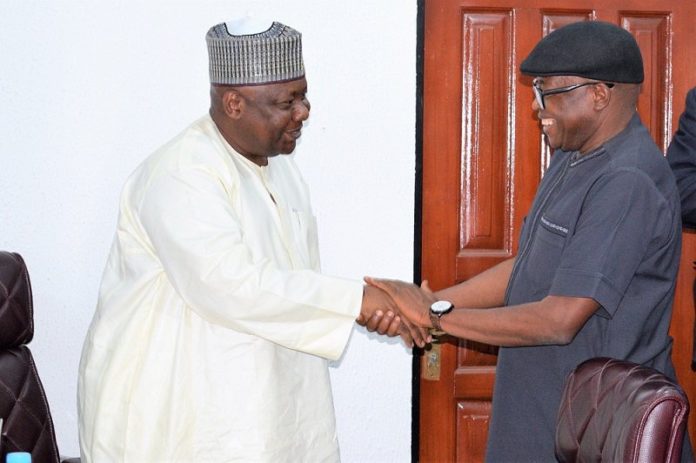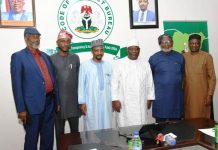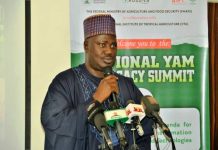The Acting Director General, Bureau of Public Service Reforms(BPSR), Mr. Dasuki Ibrahim Arabi yesterday in his office received the top management of the National Agricultural Seeds Council of Nigeria (NASC) led by the Director General, Prof. Olusegun Ojo, representatives of the United Kingdom Department for International Development (DFID) and Partnership to Engage, Reform and Learn (PERL)- DFID/PERL and Galaxy Backbone in a joint stakeholders’ forum to dissect the findings of the BPSR Self-Assessment Tool (SAT) deployed at NASC.
In his key note address, he said that the Bureau in line with its mandate from 16th July to 29th August, 2018, at the invitation of NASC deployed SAT at the corporate headquarters of the National Agricultural Seeds Council, in Shedda-Gwagwalada, and at its North-East, North-West, and North-Central Zonal level using Kano as the center. Adding that the South-South and South-East Zone using Enugu as the center, while the South-West Zone converged in Lagos as the center.
He explained that ‘SAT’ is the Self-Assessment Tool developed by the BPSR, stating that it’s an on-line tool accessible through the Bureau website:www.bpsr.gov.ng/assessment-test and it is used to assess or diagnose the existing health status of an organization. He said the Tool contains an element of independent evaluation aimed at assisting federal agencies and parastatals to assess themselves against local and international best practices to improve their performance and service delivery processes.
The Acting Director General reeled out about thirty (30) recommendations from the Bureau’s findings, among these are that NASC should develop a formal Code of Conduct that set out clearly the standards expected from those who serve on the board and employees of the Council; that NASC should develop and operationalise a Strategic Plan for the Council; develop key Performance Indicators (KPIs) to be used at multiple levels to evaluate the Council’s success at reaching targets and achieving key business objectives. Other recommendations are that NASC should conduct Training Needs Assessments (TNA) to determine training for whom, why, and for what, and use the outcome to develop a training policy for the Council.
He added that the training plan gotten from the process will ensure capacity development of the staff and increase their productive contribution, he recommended that the establishment of Anti-Corruption and Transparency (ACTU) and SERVICOM Units at the regional headquarters to address front service delivery and corruption issues. Adding that the finding strongly recommends the establishment of an ICT policy for the Council among others ensure that it appropriately utilizes modern up-to-date technology and infrastructure to ensure efficiency and improved productivity, and that NASC should establish Risk Management Policy to mitigate risks associated with changes in organizational incomes and funding streams.
Mr. Arabi noted the importance of inter-agency collaboration which he said creates opportunities for better exchange of ideas and skills across board, hence the presence of Galaxy Backbone to support NASC in the area of technology. He further recommended the setting up of inter-agency committee to work out modalities of operation.
In his response, the DG NASC, Prof. Ojo expressed profound gratitude to his colleague, Boss of the Bureau and the staff for carrying out such a sincere process of evaluation on the Council, making recommendations and mapping out strategic policies that would aid standard best practices in the Council. He also informed that NASC has a vision to be the Center of Excellence for SEEDS in Africa and therefore needs all the supports it can get from DFID/PERL in terms of funding and skills transfer as well as from Galaxy Backbone, which the Council expects to provide the required technology to facilitate its innovation to becoming Centre of Excellence, and that the Council is fast becoming a continental learning center for seed development and that Nigeria would compete favourably in the group of States and would not need to import seeds from overseas in the nearest future.
Dr. James Zasha, the partnership facilitator said that DFID/PERL is here to identify and solve the issues of key blockages to service delivery in the country and also ready to provide solutions to such constraints. He said that DFID/PERL works with BPSR on some major areas like Agriculture but discover the importance of the SEEDS Council and noted that in Agricultural diversification; the Council is very crucial because if you get good SEEDS, major issue would have been solved as high quality seed is germane to high yields which the Council champions. Mr. Abu Umaru, who is the Federal Reform Manager with DFID/PERL, also reiterated that it would provide technical support to NASC because according to him, ‘Prof. Ojo has always had the desire to bring notable changes to the Council and that he has the hunger to put the Council in the right direction’. On the proposal of NASC as Centre of Excellence, he said DFID will consider where it can support because it is an expensive project but that the development partner will assist as much as its resources can permit. He noted that there is a lot in the SEEDS Council that technology can lash into especially with digital inclusion and inter-agency collaboration which Arabi had referred to earlier.
Speaking on behalf of Galaxy Backbone, Mr. Akintayo Banisaye who is the Solution developer reaffirmed the mandate of the agency; that it is committed to overseeing government agencies websites. He said the organization’s primary role was to ensure a seamless networking and clouding systems among others in Nigeria.






